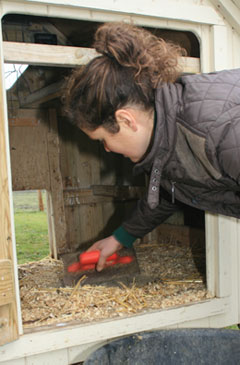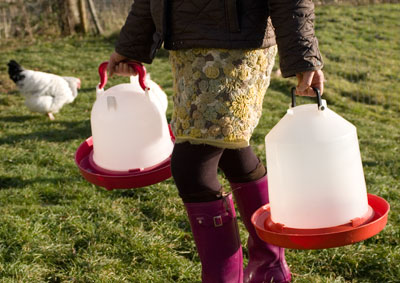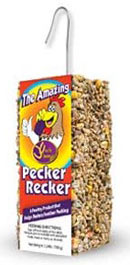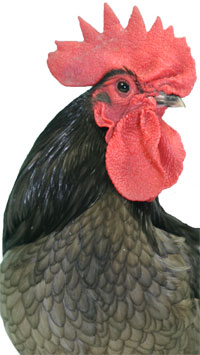Stress is a major contributor to ill health in chickens and can also make them more prone to a number of vices such as feather picking, egg eating, comb or vent pecking.
Chickens kept in intensive conditions are constantly subjected to stress which is why farmers see such high mortality rates and have to pay out to keep birds healthy and make them productive. Fortunately, keeping chickens in our back garden isn’t exactly intensive as long as they have a sufficiently large run or are let out of their run regularly to free-range although there are pleanty of other times when chickens can suffer from stress.
In short, stress is best avoided whenever possible and a little bit of care and forethought can dramatically reduce stress in your birds.
So how do we know what stresses chickens? Well, some years ago, there were studies done that measured the stress hormone ‘corticosterone’ of birds in different situations and it is this research that has enabled us to understand the stressors.
Stressors.
As well as intensive conditions causing stress, the other main stressors can seem quite trivial to us.
- Handling. This is one of the biggest stressors. Chickens are a prey species so naturally, if caught and picked up, they become stressed. Whilst regular handling is important for health checks, chasing a bird around a run for 5 minutes every time will not help. Try to catch birds in a confined area such as a house quickly and calmly. Hold the wings firmly and then transfer the bird to the holding position with your right hand underneath her, breast in the palm of your hand, fingers holding the tops of the legs. Her head should be underneath your arm so her head is looking behind you. Use your left hand to examine her.
- Introducing new chickens. Chickens are flock animals that have a pecking order. It is thought the ancestors to our chickens, the Red Jungle Fowl of South East Asia use the pecking order to assist in their survival. If every bird has her place, when it comes to feeding time, each one can have her turn and they don’t have to spend precious time arguing which may alert predators to their where-abouts. Every hen knows her place in the pecking order and by introducing new birds, the pecking order is upset. No hen knows where she stands and this will cause arguments and considerable stress for days until they have sorted themselves out into a ‘new flock’.
- Lack of food or water. This stress is completely avoidable of course but we all have those one off days when we suddenly realise that our birds have run out of water for one reason or another. A leaky water container, frozen water or just a forgetful moment!
- Extreme heat. Chickens don’t sweat. To cool down, a chicken must either take on cool water (and excrete more to lose the excess fluids and some heat) or pant which removes heat through the air they exhale. Chickens are much better equipped to deal with the cold and can keep their body temperature up by eating more and trapping air inside their feathers to insulate themselves thermally. Heat will cause chickens to become stressed.
- A new environment. This can be taking a bird to a show, getting your birds for the first time or just moving them to a different house or run. Another environmental change that is hard to avoid but causes considerable stress for your birds is when there has been a covering of snow.
- Egg laying. This is surprising since this is a natural things that chickens do but egg laying does cause stress on your hens. Giving them a peaceful, private, darkened nest box can help. Try not to disturb hens that are in the process of laying.
- Predation. Foxes or other predators visiting the garden on a regular basis are likely to cause stress. In the extreme case, after a fox attack, even though a chicken may survive the wounds inflicted by a fox (he grabs a mouth full of her feathers for example and the chicken escapes), she can still die because of the stress.

If you can minimise stress, your birds will be less prone to picking up disease which is something we would all like: happy, healthy chickens!






Hi there, I have layers I bought at a point of lay, they were layin good quality eggs since october last year,all of a sudden now the egg shells are pale and have little brown spots, could this be stress?, please help thanks
Sorry, I’m not sure – eggs can change colour slightly as the hen matures… Red / blood spots on eggs are usually red mite in the nest… not sure about brown spots though.
I had a 4 month old wellsummer pullet shipped to me yesterday. Her comb is pale, is unstable on her feet. Only stands for a minute or two at a time. She does eat and drink on her own. I am wondering what I can do to help her with this stress.
She doesn’t sound well – could be the journey so I would keep her enclosed in a small area (cage if you have one) with feed, water and some vitamins in the water.
There are painkillers in the UK called Metacam which vets can give for shock / stress. Maybe there is something similar in your country…
Nice article. Small correction – red jungle fowl originate from SE Asia, not S. America, for example: http://www.discoverwildlife.com/animals/jungle-fowl-remarkable-bird
Ah yes – thank you – I don’t know why I wrote South America. I have corrected this.
I had 8 chickens, now I am down to 7. On Good Friday, we let the chickens out of their pen to free range and while we were in the house, a Red Breasted Hawk unfortunately killed one of our chickens. As evening was approaching, I went outside to close up the pen when I noticed that the chickens had gone in for the night. I counted my chickens, as I always do, and thought I was missing one. I found her laying behind the coup tucked in the tall grass. The next day I noticed gold feathers lying on the ground. The chicken the bird killed was a Leghorn and the chicken with the gold feathers is a Buff Orpington. Since then, she has been laying around a lot and not eating or drinking. I didn’t put the two together that maybe the attack could have stressed her out until today. I thought that maybe she was egg bound. I checked her out, but I don’t feel any eggs in her abdomen. Currently she is in the house. Is there a possibility that the attack could have caused her stress and caused her to stop eating and drinking and to lay around a lot and keep her from being social with the rest of the chickens? If so, what can I do to help her? She doesn’t look sick. Her comb, face and wattles are still a healthy looking color.
Yes, this is possible, maybe the hawk tried to take a swipe at her too.
You could try using ACV in her drinking water, this really helps.
I would try to provide them with some cover overhead – a gardening net stretched out or rope zig zagged over open areas for example. Trees would be idea but they take time to grow of course!
Hi I am so upset my staffie got to 2 of my hens and killed them the other 2 escaped but when I checked on them today there was a very small egg and it had been attacked and broken. I have also just found an egg but without a shell just the membrane around it. Are my 2 chickens ever going to be able to lay again. They are modern bantams.
The odd eggs are probably caused by the stress and they could stop laying for a while but I think they will return to normal once things settle down. Just make sure the Staffie can’t get near them to scare them any more.